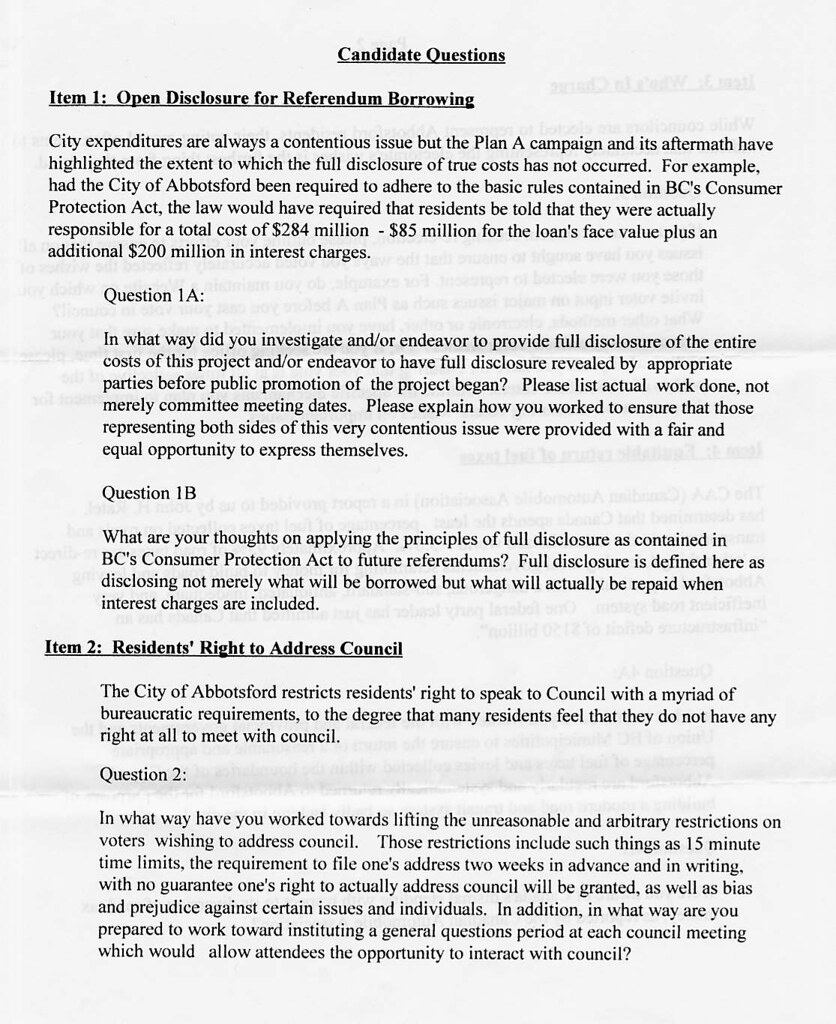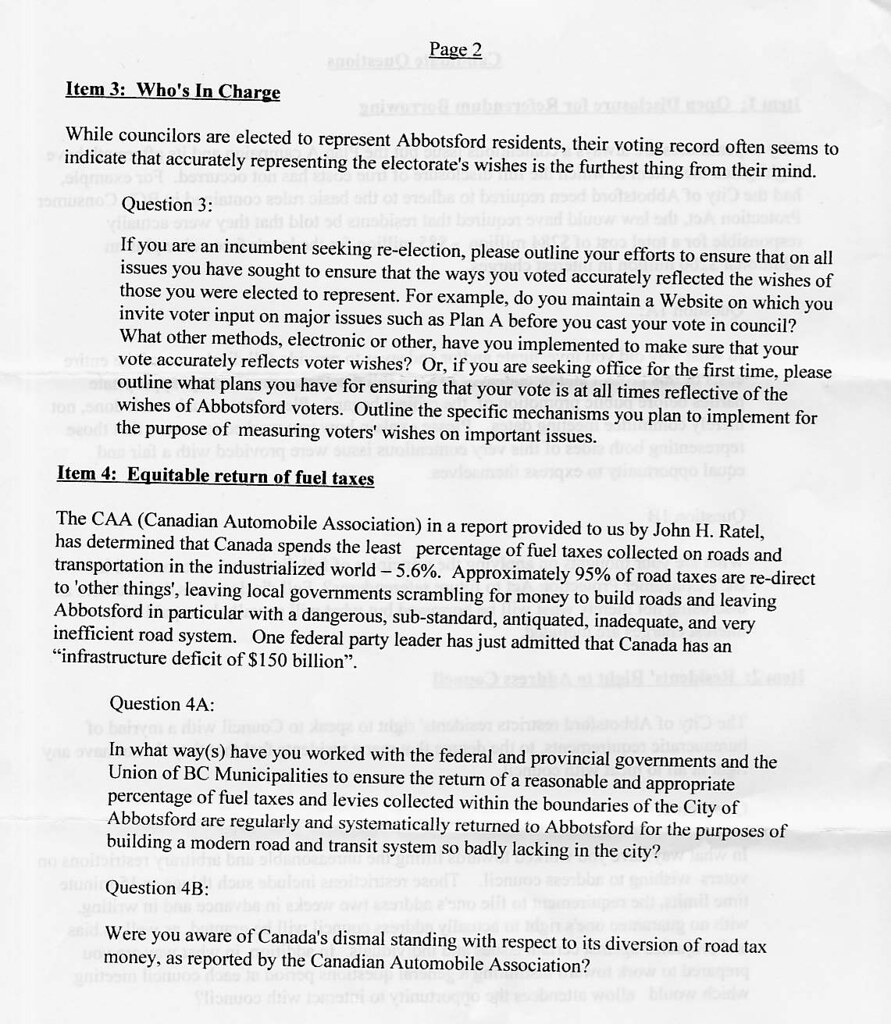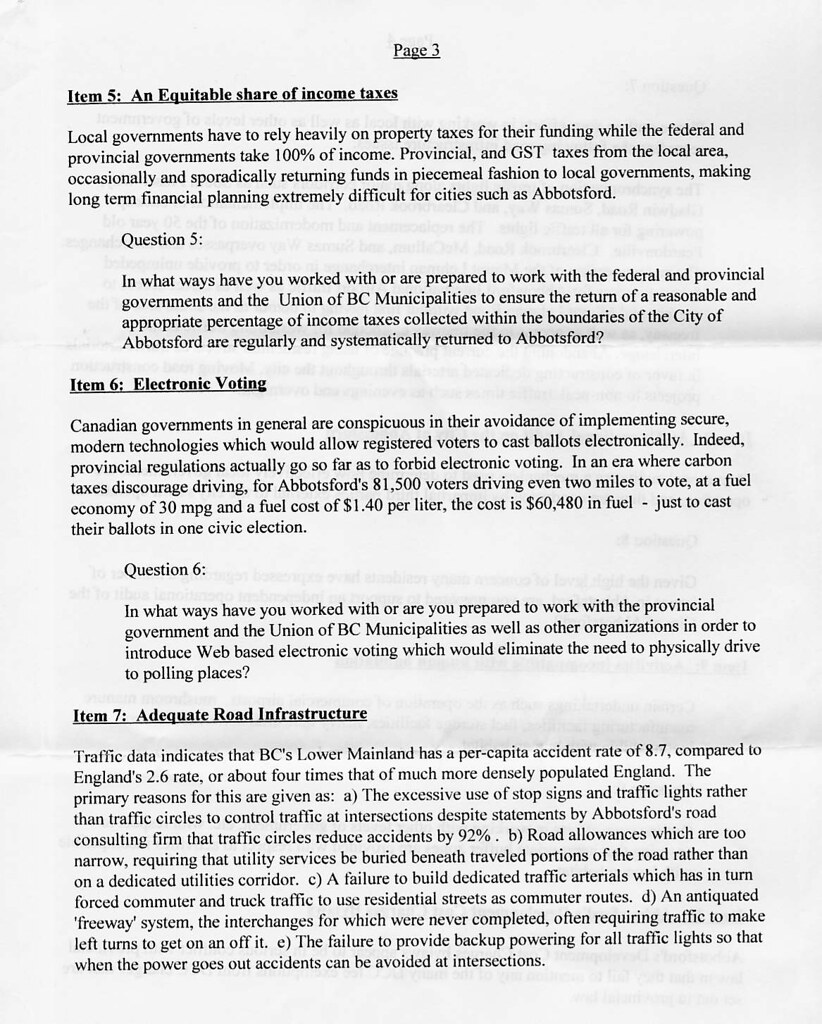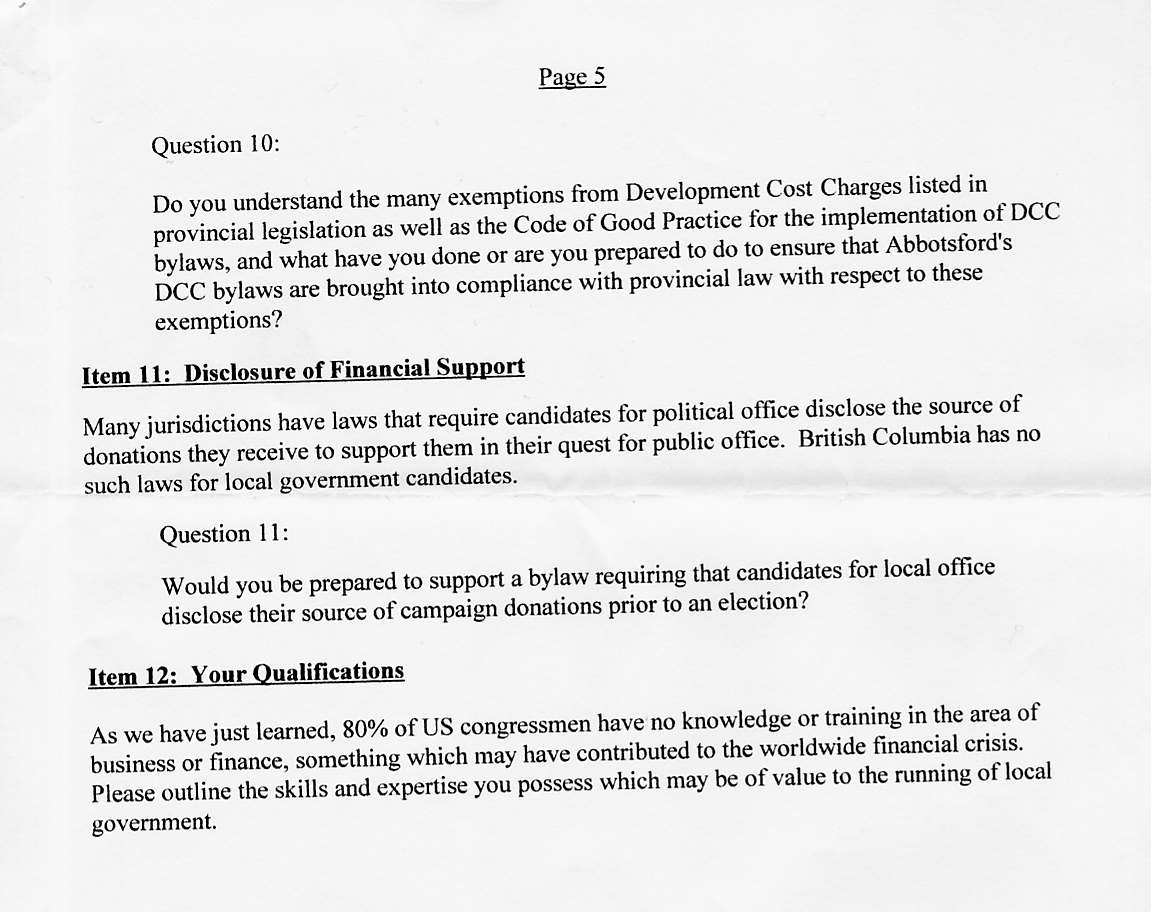Wednesday, October 22, 2008
Abbotsford Ratepayers Questions - My Answers




Question 1A:
I was a strong and vocal opponent of Plan A attending all public information meetings, asking questions of City councillors and staff, speaking with the public at the meetings, writing to the news paper and writing on www.homelessinabbotsford.com.
I filed a complaint with the BC Ombudsman over the City’s behaviour in conducting the referendum and wrote to our provincial elected officials (MLAs, premier, ministers) concerning the City’s conduct during the referendum.
I was a member of the board of directors of the ratepayers association during its first year of life and have continued to write and ask questions on the costs, the management and the effect of Plan A on the public.
Question 1B:
Since several of the articles and letters that I wrote referenced the need to consider interests costs when talking of making “profits” I clearly consider interest costs to information to be considered.
If the public wants to know how much interest the City will pay in addition to the repaying the principal, that information should be provided.
Question 2:
Speaking of unreasonable and arbitrary, what about the tone and content of this Question?
I have never been on council, but I have been a vocal and active opponent of council and wrote/complained about the way the Plan A referendum was handled.
However I would have to say that reasonable restrictions on making presentations to council are not unreasonable nor a barrier to addressing council. For example: the 15 minute time limit cited in the question is not unreasonable; requiring advance notice of the matter you want to bring before council is to be expected – groups I am a member of like the courtesy of including topics in the agenda, does not the ratepayers association have agendas for its meetings?
As to addressing council, limits to avoid the same person, topic or questions from appearing week after week after week and preventing other citizens from raising new topics and questions are needed but must be clear as to the rules.
New persons, topics or questions cannot/should not be denied just because the council does not want to hear them.
I am fully prepared to support an opportunity for the public and attendees to pose questions to council and think such an idea has merit. However I will not support a limitless free-for-all. Such a questions session would need to be structured to permit access to new speakers and for new topics not for the same people and topics to be raised time and time again.
I plan to have a website to blog about what is happening to council that would permit feedback and discussion.
Question 3:
I do not believe in government by referendum or survey; in fact I would say that popularity contest is a terrible way to make decisions.
I certainly hope that people elect you to council based on your experience, judgment and character, expecting you to exercise those traits in making decisions on their behalf.
I think the public needs to be heard; allowed to raise questions, concerns and ideas on matters; that a councillor has to listen to all of this input; but I believe that as a councillor you need to make decisions based on one’s experience, judgment and character. I do believe that the public is entitled to know why you decided as you did.
This is why I plan to blog about items and decisions facing the city and council - and expect feedback in the form of comments from the public.
I volunteer with several local organizations, sit on non-city committees, am a board member of a local organization and am connected to the community in a variety of other ways. I fully expect and hope that this will provide me with direct feedback and input and ideas from the public on city, council and public matters.
Question 4A:
I have had no involvement on this matter. While municipalities can raise this issue I am not sure there is any way for a municipality to exert pressure on more senior levels of government on this matter. Indeed it seems to me that this is a matter where the public is more suited and likely to affect change than a municipal council.
Question 4B:
I am aware that monies that are designated to improve and maintain our roads goes into general revenue and that it for the most part stays in general revenue and is not spent on our roads as intended.
Question 5:
I think this is far to complex an issue to address in the limited time and space available.
I also have some serious concerns and reservations about the effect this may or could have on funding for smaller communities, the sparsely populated regions etc.
While this is a concept that sounds simple it is in fact very complex, with far reaching consequences and affects.
This is an issue that has to be addressed not at an individual city level but by cities as a group to negotiate an agreement among provincial, federal and municipal levels of government.
In the meantime when the federal or provincial government download responsibility they need to provide funding for the municipality to pay for those downloaded responsibility. Infrastructure and other expensive expenditures also require funding support from higher levels of government with their higher ability to raise funds other than through property taxes.
Question 6:
I am not in favour of web based electronic voting, so I am not only not prepared to work for it, would in fact oppose it.
Your fuel cost argument is nonsensical.
If you do not want to spend money on gas – walk. I did when lack of a vehicle or poverty required me to walk to the poll to vote.
Getting out and voting is easy in Canada. If you are not prepared to expend the minimal effort required to vote – tough.
Question 7:
You left out the kitchen sink.
You pose a reasonable, sensible question on road infrastructure and I will answer it.
Question 8:
Yes.
Question 9:
Not Applicable.
Question 10:
I have read the applicable provincial statute and the guide provided by the province for municipalities to understand the statute and implementation of DCC.
I am aware of the questions/problems with Abbotsford’s new DCC bylaws. I have written about this matter on homlelessinabbotsford.com, in a letter to the newspaper and in letters to the Minister responsible and Premier Campbell.
We need to address this matter and bring Abbotsford’s DCC bylaws into line with provincial law.
Question 11:
Does not disclosure “prior to an election” inherently also include possibility or requirement of disclosing donations prior to such donations being made?
I have no problem with the concept of providing information about funding and donations prior to an election. However I really need to know exactly what your proposal entails before I can say yes or no. At the municipal levels many candidates do not have organizations and I am not willing to put in place requirements that will be barriers to citizens who want to run for local office and favour those with the resources to provide such information.
I personally cannot afford to spend money on campaigning and since I can think of many better uses to be raising money for I have no intention of formally raising money for my campaign.
A friend decaled his van with vote of James W. Breckenridge for city council and gave me a decal for my car. Some friends have spoken about doing something about getting some signs up – time will tell what happens on that front.
I am campaigning through candidates meetings, networking and getting out and meeting people.
Question 12:
I have been a resident of Abbotsford (and Matsqui) for twenty years.
I have a commerce degree, was a chartered accountant, have experience in public practice and business.
I manage to pay all my bills and the next months rent every month, living within my means.
Our city faces serious social issues in affordable housing, addiction, mental illness, the working poor and poverty all areas I have experience and familiarity with.
Unique life experience having been solidly middle class, ended up homeless from mental health challenges, worked hard to become mentally healthier than at any other point in my life, struggled to find and get into housing.
I volunteer with several organizations in our community; this includes a volunteer relationship were I was volunteering while homeless. I am co-chair of the Abbotsford Mental Health and Addictions Advisory Committee and sit as a member on a Fraser mental health and addictions committee. I am on the board of the Focus Disability Network Society. I am a member of several housing committees and groups in Abbotsford.
I work at the shelter in Abbotsford, do peer support and facilitate WRAP (wellness recovery action plan) groups.
I have friends, acquaintances and connections throughout the community.
I have been actively involved and engaged in the community, with community issues and with city and council decisions and behaviours.
In Conclusion:
I have taken the time to answer these questions because I believe the public has a right to this type of information in deciding whether to vote for me.
However I found the tone of the letter objectionable, particularly the accusatory tone in reference to current or prior council members.
Some of the questions were far to complex and convoluted to be answerable.
Given that the questions arrived in the mail on the very day they were due to have been answered and returned the questionnaire was unreasonable in its length and complexity.
I also find it hard to believe that these are the 12 top questions and concerns of the citizens of Abbotsford; they certainly are not representative, except in a few instances, of the concerns that have been expressed to me by the public at large.
James W. Breckenridge
Tuesday, October 14, 2008
LEADERSHIP.
The conclusion I reached was that it has been so long since Canadians and people around the world have had any real leadership in the public and political arenas that Canadians and others no longer know or understand what leadership is and so they accept the pale imitation passed off as leadership today.
In considering Mr. Harper’s “leadership advantage” it became clear that people have erroneously come to falsely mistake management for leadership.
“Management is doing things right; leadership is doing the right things.” Peter Drucker
Calling this election as Mr. Harper did was a management decision based on perceived political opportunity and advantage. The right thing to have done, the right message to send and example to set was to not to give into temptation but to obey they law Mr. Harpers government had passed as necessary to prevent political opportunism by federal parties – the opportunism he gave into.
Mr. Harper made a strategic decision rather than a decision based on character ignoring the wisdom shared by General H. Norman Schwarzkopf that "Leadership is a combination of strategy and character. If you must be without one, be without the strategy."
Mr. Harper may well run a tight ship, ruling with an iron fist but as Dwight D. Eisenhower noted “You do not lead by hitting people over the head-that's assault, not leadership.”
Arnold Glasgow: "One of the tests of leadership is the ability to recognize a problem before it becomes an emergency." One of the ways you do this is by facing the music, even if you don’t want to hear the tune.
Not only has Mr. Harper refused to acknowledge problems that interfere with his plans or that he doesn’t want to talk about - demonstrated by his recent behaviour of repeatedly stating the Canadian economy was fine in the face of evidence to the contrary; Mr. Harper fails to acknowledge or act on issues such as the major social problems facing Canadians and our cities (homelessness, poverty, affordable housing) that do not fit into his world view.
"A real leader faces the music, even when he doesn't like the tune." Anon
Of course with reference to major social problems such as homelessness, poverty and affordable housing Mr. Harper is not alone in his refusal to see or address a problem while it is more manageable in size rather than allowing it to grow into a large problem or a crisis. Provincial governments/politicians as well as municipal governments/politicians also chose to turn a blind eye to these issues, pointing their fingers at others as being responsible for addressing the issues and when they grew into an epidemic – they run around the proverbial “chickens without heads”.
They bury their heads in the sand to avoid seeing or hearing what they do not want to see or hear while Canadians long for the “good old days” as society becomes less civil and more dog-eat-dog.
“The very essence of leadership is that you have to have vision.” Theodore Hesburgh.
Why is vision so important? Because if we want a civil, supportive and healthy society we all need to be better than we are.
We have to do the little things and the big things – the things we would rather not do or have to do. For example: Carry your litter until you find a garbage can to put it in; Saying please and thank you or being patient in line-ups; Donating to the food bank – even when worried for ourselves; Taking a deep breath and behaving in a rational manner – even when our emotions are running high; Remembering that children are the future, that we need to raise healthy children and that it takes a community to raise a child and that as a community we need to invest and provide the resources needed to raise healthy children; Look at the long term as well, instead of focusing on the short term – yes “going green” will cause some economic pain but not making those changes will, in the longer run, cause economic disaster;
It is this need bring out the best that led Blaine Lee to state "The great leaders are like the best conductors - they reach beyond the notes to reach the magic in the players."
To do that you need vision not dogma as reaching for the magic in the players requires inspiring the player to want to strive for the vision. Reaching out to inspire also serves to remind a leader that decisions made have an effect on the players in the real world and you have to consider, to understand, that those decisions will have effects in the real world.
“Leadership should be born out of the understanding of the needs of those who would be affected by it.” - Marian Anderson
I do not know if it is ideology or that he just does not get it, but Mr. Harper’s actions and words show a total lack of understanding of the costs and challenges of issues such as child care for most Canadians. Mr. Harper stated that the other parties’ plans to replace the nominal $100 per month Conservative policy with a real investment in childcare were a bad idea because parents would lose the $100 a month. Ordinary Canadians struggling with child care need real help, not a token $100 a month. Of course for the wealthy the $100 was a nice bonus, a further transfer of wealth to the wealthy from the poor.
The flagrant lack of understanding demonstrated by Mr. Harper on this manner is the effect this $100 a month could have on those who were not wealthy or well off. i.e. those families where the extra $1200 put them over the income limit at the food bank and disqualified them from using the food bank. For these people the $100 a month was a devastating blow to their survival – forget about child care. Making up for not being able to access the food bank cost more out of pocket than they received, making the child care payment a cost not a gain.
Don’t they ever think? What world are they living in? Hey – pay attention to the effect of your actions in the real world. You’re supposed to represent all Canadians not just the wealthy and corporations.
Federal, provincial, municipal politicians – I can not count the times I have made those statements or heard them from others.
“Becoming a leader is synonymous with becoming yourself. It is precisely that simple, and it is also that difficult.” - Warren Bennis
I end with this quote because life has, over the past few years, taught me just how important it is to grow and to continue to grow as a person; just how difficult and uncomfortable that can be; how rewarding making the effort and working through the discomfort is.
I am comfortable in my own skin now and like the person I have become and am becoming. I will not be having spin doctors dressing me up in warm fuzzy sweaters or staging “meetings” with families, not simply because becoming who I am has granted me empathy and understanding, but because such falsehoods would not be being true to ME.
In becoming yourself you learn the importance of not taking yourself to seriously, of being able to laugh at yourself; that life is something to be lived and enjoyed and far to important to be taken only seriously.
Wednesday, October 08, 2008
Give Thanks by sharing.
Thanksgiving came to us from England where it was called the Harvest Festival.
Harvest is from the Anglo-Saxon word hærfest, "Autumn". It then came to refer to the season for reaping and gathering grain and other grown products.
Harvest Festival used to be celebrated at the beginning of the Harvest season on 1 August although nowadays the festival is held at the end of harvest. Farmers celebrated the end of the harvest with a big meal called a harvest supper.
This is where our tradition of Thanksgiving Dinner comes from.
In Britain people bring in food and the food is often distributed among the poor and senior citizens of the local community.
What better act to give thanks for one’s good fortune, benefits and favours than to share food with those members of the community who are not so favoured or fortunate?
Please, as you gather the items and ingredients for your Harvest Supper, remember the Abbotsford Bank - gathering a few items to share with those in need in our community.
If you cannot publish this letter by me due to the election, please remind your readers in whatever manner you choose to remember those who have less or little to be thankful for.

